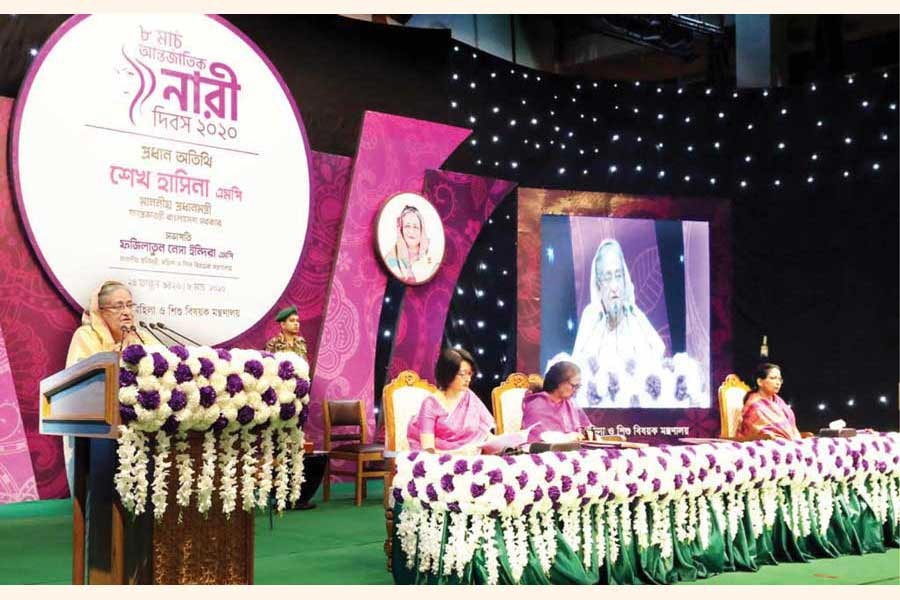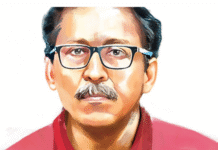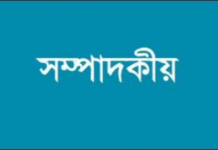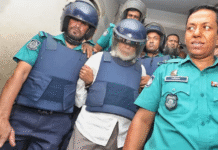Women empowerment and SDGs in Bangladesh — Part I
Shamsul Alam |March 08, 2020
 Prime Minister Sheikh Hasina speaks during an event marking the International Women’s Day at Osmani Memorial Auditorium in Dhaka on Sunday, March 8, 2020. —Photo: Focus Bangla
Prime Minister Sheikh Hasina speaks during an event marking the International Women’s Day at Osmani Memorial Auditorium in Dhaka on Sunday, March 8, 2020. —Photo: Focus Bangla
The United Nations General Assembly at its 70th session held on September 25, 2015 adopted the outcome document of the UN summit for the adoption of the post-2015 development agenda entitled ‘Transforming Our World: the 2030 Agenda for Sustainable Development’ and decided on new global Sustainable Development Goals (SDGs). At the core of the 2030 Agenda is a list of 17 Goals (SDGs) and 169 targets to end poverty, hunger and inequality, take action on climate change and environment, improve access to health and education, care for people and the planet, and build strong institutions and partnerships.
The Agenda 2030 thus becomes quite comprehensive. The SDGs are unprecedented in terms of scope and significance and go much beyond the MDGs (Millennium Development Goals/2001-15) by including economic growth, sustainable production and consumption, sustainable urbanisation, big data generation for tracking progress and importance of peace and justice for all. The Agenda 2030 calls for action by all countries — poor, rich and middle income.
Bangladesh has been widely acclaimed as one of the forerunners of MDGs implementation and attainments. It achieved many targets ahead of time and others within the 2015 deadline. It made outstanding progress in the areas of poverty alleviation, ensuring food security, primary school enrolment, and gender parity in primary and secondary level education, lowering infant and under-five mortality rate and maternal mortality ratio, improving immunisation coverage, and reducing the incidence of communicable diseases. Buoyed by its success Bangladesh became an active participant of the global process underlying the preparation of post-MDG agenda with its domestic and global actions.
The General Economics Division (GED) of the Bangladesh Planning Commission, steered the preparation of a draft of the post-2015 Development Agenda suggesting Goals and Targets and several indicators. Several rounds of consultations with multiple stakeholders including government officials, public representatives, civil society organisations (CSOs), and media representatives took place in 2013 at both national and sub-national levels. The document also benefited from inputs provided by relevant government ministries, experts from UN organisations, and development partners.
POST-2015 DEVELOPMENT AGENDA: Bangladesh’s Proposal to the UN came up with 11 goals, 58 targets and 241 indicators. The goals concerned pressing development issues embracing human potential, reducing poverty and inequality, attaining food security and nutrition, health and family planning, gender equality, quality education and skills, employment and worker rights, good governance, sustainable production and consumption, environmental sustainability and disaster management, and forging international cooperation and partnership. Notably the Bangladesh proposals were consistent with the global aspirations as 9 out of 11 proposals were common to those proposed by Open Working Group (OWG) of the United Nations responsible for drafting of post-MDGs Development Agenda.
The other goal proposed by Bangladesh was reflected as target in SDGs. The SDGs are not though legally binding, governments are expected to take ownership and establish national frameworks for achievement of the goals.
PHILOSOPHY BEHIND IMPLEMENTATION OF SDGs: It is ‘Whole of Society’ approach, and for leaving no one behind and participation of women. Bangladesh has made a remarkable progress in terms of institutionalising the SDGs implementation mechanism. For achieving Vision 2041 and emerging as a high income country by 2041, the country has adopted the Perspective Plan 2021-2041 and is on course to finalising the 8th Five-Year Plan (2021-2025) that aim to ‘leave no one behind’ (LNOB) and promote equitable and inclusive growth and development. The government of Bangladesh has consistently applied ‘whole of society’ approach to preparation of national development plans and policy documents of national importance. The government believes that success in attaining SDGs relies on mainstreaming all the deprived and disadvantaged group of people. With this vision, GED undertook a study to identify the most vulnerable groups who need special attention and these include old women, poor female-headed households and rural poor women, among others.
WOMEN DEVELOPMENT IN 7TH FIVE-YEAR PLAN: The consecutive Five-Year Plans (FYP) incorporated provisions for women’s development and gender equality in line with international commitments. The 7th Five-Year Plan (7Th FYP) 2016-2020, incorporated strategy for gender equality and women’s advancement and subsequent plans (FYPs) will aim at achieving the SDG targets. The government has set national targets and indicators as well as an action plan to implement the SDGs.
The 7th FYP adopted a comprehensive framework for promoting gender equality with four strategic objectives. These were: (a) improving women’s human capabilities, (b) increasing women’s economic benefits, (c) enhancing women’s voice and agency, and (d) creating an enabling environment for women’s advancement. These were backed by policy and legal framework and being implemented by using gender responsive budgeting (GRB). Actions for women’s development were directed towards eight key areas in 7th FYP and these are:
* Increase access to human development opportunities;
* Enhance access to and control over productive resources;
* Increase participation in decision-making;
* Establish conducive legal and regulatory environment;
* Improve institutional capacity, accountability and oversight;
* Increase protection and resilience from crisis and shocks;
* Promote positive social norms;
* Encourage women participations in cottage, micro, small and medium enterprises
The government is preparing its 8th Five-Year Plan (8th FYP) for 2021-2025 and emphasising the unfinished agenda to achieve the SDGs. Gender equality and women’s empowerment is one of 10 priority action areas declared by the Prime Minister of Bangladesh. Therefore, promotion of gender equality and women’s empowerment will continue as priorities in the 8th FYP. (To be continued)
Dr Shamsul Alam is Member (Senior Secretary) at General Economics Division,
Bangladesh Planning Commission.
sambau23@gmail.com
The article appeared in the The Financial Express









